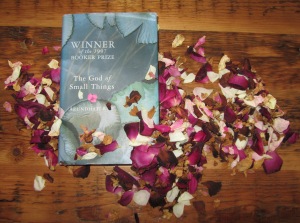 Winner of the Booker Prize in 1997.
Winner of the Booker Prize in 1997.
I picked this up in a charity shop a few weeks ago and then discovered that I had it already. It was given to me as a gift but languished, unread, in a corner. My instinct to put off reading it may have been a good one. You would want to be in the whole of your mental health before launching into this one.
This is the story of Rahel and Estha, two-egg twins, whose childhoods are obliterated by the events of a fortnight.
The author trained as an architect. This makes sense to me as the book is constructed on different levels. The narrative slides around in time and perspective in a manner reminiscent of an Escher poster. It’s not difficult to follow but it’s unsettling. This book never lets you get comfortable.
It is, I think, almost a poem. Here’s a small excerpt;
It was a beautiful house.
White-walled once. Red-roofed. But painted in weather-colours now. With brushes dipped in nature’s palette. Moss-green. Earthbrown. Crumpleblack. Making it look older than it really was. Like sunken treasure dredged up from the oceon bed. Whale-kissed and barnacled. Swaddled in silence. Breathing bubbles through its broken windows.
Crumpleblack.
The plot is heart-breaking but the true wonder of this book, for me, was in the telling. Life happens to children.
Anything can happen to anyone.
Things happen that children can’t understand. Children are rarely in possession of all the facts. Adults, even well-intentioned adults, lie to and manipulate children.
As grown-ups, we try to make sense of the stories of our childhood. There are stories that no-one likes to talk about. There are secrets. Sometimes we never find out what really happened or we never know why it happened. Sometimes, the discovery of truth takes the ground from under us.
Somehow, Arundhati Roy captures perfectly the sequential unveiling of a child’s story over time.
I thought that this was an exceptionally impressive book but an exquisitely painful read.


